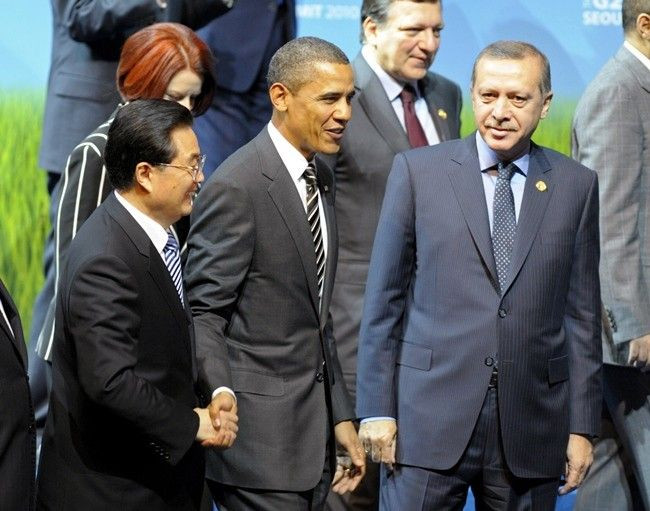China and U.S. take center stage

A major question emerging here in Seoul on the final day of the G-20 Summit, as world leaders personally powwow on global dilemmas, is this: Can the U.S. and China play nice?
In the days and weeks leading up to the conference, the two largest economies in the world have been trading barbs on currency and trade imbalances, and accusing each other - sometimes in veiled remarks, sometimes not - of protectionism.
China artificially keeps its currency, the yuan, at a low exchange rate, despite the criticism the policy draws.
The U.S., seeking to pep up a sluggish recovery, recently announced its QE2 program - that is, Quantitative Easing 2 - where the Federal Reserve will buy bonds and, thereby, inject $600 billion dollars into the system.
Many world governments, including Germany, Russia, Brazil and Taiwan, have reacted to the U.S. move with criticism and concern that QE2 will fuel inflation, with devalued U.S. dollars streaming into foreign countries.
China has blasted the U.S. measure as protectionist, inflationary and destabilizing for the global market. China has said that the U.S. is doing the very thing it accuses other nations - China, that is - of doing.
As a major reserve currency issuer, for the United States to launch a second round of quantitative easing at this time, we feel that it did not recognize its responsibility to stabilize global markets and did not think about the impact of excessive liquidity on emerging markets, Zhu Guangyao, China's vice minister of Finance said Monday.
U.S. President Barack Obama, who arrived in Seoul on Thursday, has defended the measure.
I will say that the Fed's mandate, my mandate, is to grow our economy. And that's not just good for the United States, that's good for the world as a whole, Obama said while in India last week.
The worst thing that could happen to the world economy, not just ours, is if we end up being stuck with no growth or very limited growth, he said.
Obama reiterated this position at a press conference yesterday with South Korean President Lee Myung-bak.
In answer to a question regarding Germany's criticism of QE2, Obama said:
The most important thing that the United States can do for the world economy is to grow -- because we continue to be the world's largest market and a huge engine for all other countries to grow. Countries like Germany that export heavily benefit from our open markets and us buying their goods. That's true for every G-20 member.
Lee, when asked if he feared devalued U.S. dollars flowing into and destabilizing the South Korean economy, joked that he wished he didn't have to answer that question with Obama standing next to him.
What's most important for us and for everyone around the world, including the Americans, is for the U.S. economy to be robust, to recover, and to continue to grow, Lee then said.
Analysts say it is crucial for the U.S. and China to find a way to agree on at least some points regarding currency and trade for the G-20 to maintain legitimacy as a coalition that can direct global economic policies.
German Chancellor Angela Merkel, who in recent weeks has been openly critical of U.S. moves, took a softer tone when she arrived in Seoul.
It's a very good thing to yet again demonstrate that we are willing to share responsibility together and to use this meeting here to send a signal, really, a good signal for our global growth, Merkel told reporters before entering into bilateral talks with the American president on Thursday.
Obama and Chinese President Hu Jintao were gracious and conciliatory at their first public appearance together in Seoul, also on Thursday, before a private meeting.
As two of the world's leading economies, we've got a special obligation to deal with ensuring strong, balanced and sustainable growth, Obama said. We have created a structure -- a Strategic and Economic Dialogue -- in which our teams have been working on a whole range of issues. And we're seeing significant progress.
The Chinese side stands ready to work with the U.S. side to increase dialogue, exchanges, and cooperation so that we can move forward the China-U.S. relationship on a positive, cooperative and comprehensive track, Hu said.
Many here - national and business leaders, as well as heads of NGOs - would like to see those sentiments fleshed out and memorialized in the G-20 communiqué, with some concrete steps enunciated for achieving more equity and stability in world markets.
Obama and several other leaders have said that there will be an agreement by the end of the day. But indications are that it will resemble a punt rather than a touchdown.
U.S. Treasury Secretary Timothy Geithner said recently in Japan, en route to Seoul, that it was unlikely that world leaders at the G-20 would reach agreement on hard numbers.
It's more likely that countries will agree on a common approach, and finance ministers from the member countries will debate the details later, he said.
© Copyright IBTimes 2025. All rights reserved.





















